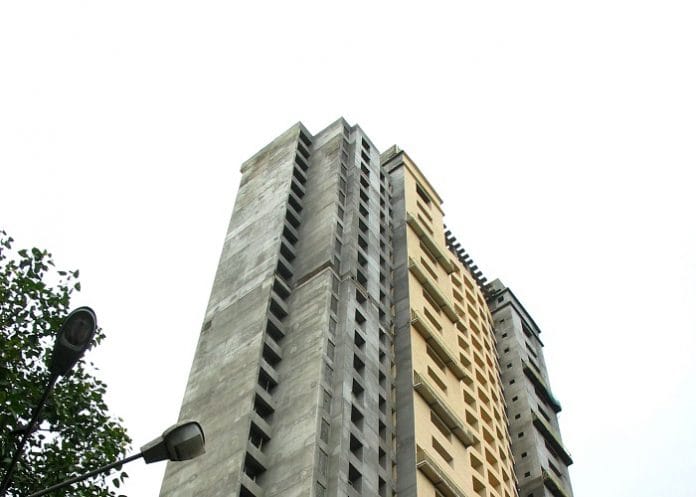New Delhi: In what seems to be a move to expedite the long-pending probe into Adarsh Housing Society scam, in which Congress leader and former Maharashtra chief minister Ashok Chavan is an accused, a team of Enforcement Directorate (ED) officials last Thursday visited the controversial society in Colaba, Mumbai, and took measurements of the building.
The measuring exercise is usually done before a property is attached under the Prevention of Money Laundering Act (PMLA). In a statement released late Thursday evening, the agency, however, clarified that “no fresh investigation has been taken up by Enforcement Directorate in Adarsh Society Scam”.
A source in the ED said the team had actually visited the society for evaluation of the property, which is done on a yearly basis to know its current market value.
The source said ED had appointed a valuer who had gone to the Adarsh Housing Society to measure the apartments, and that this had nothing to do with the investigation of the case or the attachment of the property.
The ED visit, however, came at a time when an NCP-Shiv Sena-Congress alliance was set to form government in the state.
This is the second time ED officials visited the 31-storey building in seven years after they registered a case in 2012 based on an FIR by CBI. The FIR had named Chavan along with other politicians.
Also read: Two former Army Chiefs, 8 top officers indicted by MoD inquiry into Adarsh scam
The Adarsh case
The case dates back to November 2010 when it was found that flats in the Adarsh housing society, which were originally meant to be allotted to 1999 Kargil war heroes and war widows, were given to people who were not eligible.
Initially, a preliminary inquiry was initiated into the matter and an FIR registered in January 2011 by the CBI under section 120 (b) for criminal conspiracy and under various sections of Prevention of Corruption Act, 1988.
Chavan and 13 others were named in the case. Chavan had resigned from the post of chief minister in 2010 after his name cropped up in the scam.
Following the CBI case, the ED, too, lodged a case under the PMLA on 5 March 2012 against 14 persons — the same people named in the FIR filed by the CBI.
According to the Enforcement Directorate, the accused persons got clearances to construct flats in the Adarsh Housing Society illegally and also obtained them at throwaway prices.
According to the FIR by ED, the accused also projected tainted property as untainted.
The CBI had accused Chavan of approving additional floor space index (FSI) for the society and accepting two flats for his relatives in return.
He is also accused of illegally approving and allocating 40 per cent of the flats to civilians even though the society was originally meant for Army personnel.
There were 12 civil servants named in the scam, including the then city municipal commissioner Jairaj Phatak, who was arrested.
Besides Chavan, two other former chief ministers, Sushilkumar Shinde and Vilasrao Deshmukh, are also under investigation.
Case moving at snail’s pace
In 2011, a judicial inquiry was ordered into the case.
Following this, the Maharashtra government constituted a two-member judicial commission and more than 182 people were questioned. The commission furnished its report in 2013.
The investigation into the case revealed that around 25 flats were illegally allotted and of these, 22 flats were bought under fake names.
The CBI filed its charge-sheet on 4 July 2012, accusing Chavan of conspiracy and corruption. The CBI then sought a sanction from then Maharashtra governor to arrest Chavan.
The investigation then went on and in October 2015, the CBI submitted evidence to Maharashtra Governor C. Vidyasagar Rao, seeking sanction to prosecute Chavan.
In February 2016, Rao granted the CBI permission to prosecute Chavan, but he approached the Bombay High Court, challenging the governor’s order.
The high court quashed the governor’s sanction to prosecute Chavan and said the CBI failed to present any fresh material that could be converted into evidence.
The same year, the Supreme Court ordered the Army to take possession of the building for security reasons. That time, most of the flats were sealed and only a dozen were unlocked. At present, all the flats in the society are empty.
(This report has been updated to include ED’s statement)
Also read: Adarsh: The officers who took a stand







The most constructive outcome of this case would be for the entire building to be allotted to the MoD, for use as Officers’ quarters. That could help iron out wrinkles in CRZ violations. Genuine members could be refunded the principal amount they have paid towards construction and other legitimate expenses. In case of bogus / fictitious allotments, those amounts could be forfeited. Demolition of the tainted structure would be a waste of national resources.